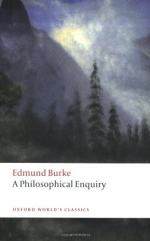
|
| Name: _________________________ | Period: ___________________ |
This test consists of 5 short answer questions, 10 short essay questions, and 1 (of 3) essay topics.
Short Answer Questions
1. What is this creative power of the mind incapable of producing?
2. What does Burke use as an example of difficulty as greatness?
3. What large part of text has Burke added between the First and Second editions?
4. What problem does Burke see with the contemporary notion of "taste?"
5. Why are the cries of animals sublime, according to Burke?
Short Essay Questions
1. How does Burke describe sympathy?
2. What is "magnificence," according to Burke?
3. What are some of the cautions or caveats Burke offers to his readers in the Second Preface?
4. Describe the types of dimensional greatness Burke notes are part of the sublime.
5. Describe the main difference between light and dark relative to the sublime.
6. What qualities of sound produce the sublime, according to Burke?
7. Describe Burke's definition of the sublime.
8. What is the cause of a wrong taste, and what are examples of it?
9. Why, according to Burke, are the principles of reason and taste the same in all humans?
10. What is the main problem with creating prescribed definitions, especially of taste, according to Burke?
Essay Topics
Write an essay for ONE of the following topics:
Essay Topic 1
Describe Burke's definition of the sublime. What passions or sensations fuel it? What is the significance of pain and pleasure to the sublime? Describe Burke's ideas of the passions belonging to self-preservation and the passions belonging to society. What are the key differences between them? Give at least three examples of things which would be considered sublime, and explain the relevance of these examples.
Essay Topic 2
In the Introduction on Taste, Burke qualifies his purpose of defining the origins of the sublime and the beautiful. What, according to Burke, is the main problem with creating prescribed definitions, especially taste? What do definitions essentially do, and in what ways can they limit rather than enlighten? Considering Burke's mission regarding and methods used in the "A Philosophical Enquiry Into the Origin of Our Ideas of the Sublime and Beautiful," do you find anything ambiguous or undermining about Burke's reservations on definitions? Do you find inconsistencies here that make you think differently about reading "A Philosophical Enquiry Into the Origin of Our Ideas of the Sublime and Beautiful"?
Essay Topic 3
Discuss the physical effects of fear and pain, as observed by Burke. How do people in pain look or sound, and what is their state of mind? What passions could they be experiencing? What is the difference Burke identifies between fear and pain, as related to the body and the mind? How can pain be a cause of delight, in everyday life and in effecting the sublime? What examples does Burke use to prove this point?
|
This section contains 1,025 words (approx. 4 pages at 300 words per page) |

|




